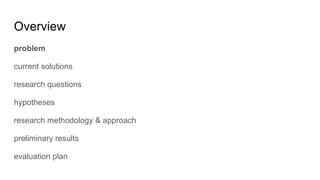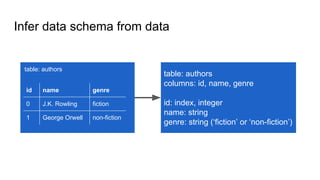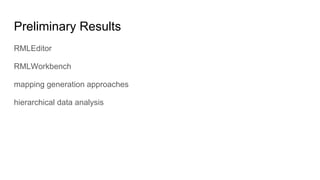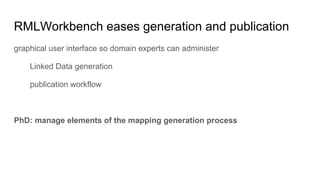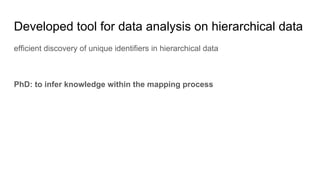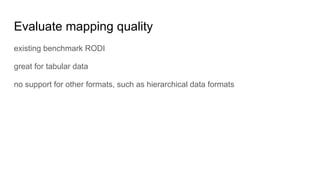Ontology-Based Data Access Mapping Generation using Data, Schema, Query, and Mapping Knowledge
- 1. Ontology-Based Data Access Mapping Generation via Data, Schema, Query, and Mapping Knowledge Pieter Heyvaert pheyvaer.heyvaert@ugent.be
- 2. Semantic Web technologies rely on Linked Data querying visualizations publishing
- 3. But not all data is accessible as Linked Data databases XML files JSON files
- 4. Solutions to provide access exist manual: completely done by the user semi-automatic: users provide feedback automatic: no user interaction required
- 5. But they have limitations limited to specific use cases limited support for complex use cases
- 6. PhD’s goal: improve access to Linked Data
- 7. Overview problem current solutions research questions hypotheses research methodology & approach preliminary results evaluation plan
- 8. Overview problem current solutions research questions hypotheses research methodology & approach preliminary results evaluation plan
- 9. How do we provide access? non-Linked Data Linked Data ?
- 10. How do we provide access? non-Linked Data Linked Data ? id name genre 0 J.K. Rowling fiction 1 George Orwell non-fiction table: authors
- 11. Apply mappings on non-Linked Data non-Linked Data Linked Data mapping mapping: rules to generate RDF terms and triples using data and ontologies
- 12. Apply mappings on non-Linked Data non-Linked Data Linked Datamapping id name genre 0 J.K. Rowling fiction 1 George Orwell non-fiction table: authors rule: create url from id rule: name is value for ex:fullname rule: if genre is ‘fiction’ class is ex:FictionAuthor else class is ex:NonFictionAuthor
- 13. Apply mappings on non-Linked Data non-Linked Data Linked Datamapping id name genre 0 J.K. Rowling fiction 1 George Orwell non-fiction table: authors ex:0 a ex:FictionAuthor . ex:0 ex:fullname ‘J.K. Rowling’ . ex:1 a ex:NonFictionAuthor . ex:1 ex:fullname ‘George Orwell’ .
- 14. Mappings need to be created from scratch (single-scenario use case) mapping A by reusing previous mappings (multi-scenario use case) mapping B mapping C mapping
- 15. (Semi-)automatic methods are preferred mapping manual (semi-)automatic
- 16. Still a number of challenges left dealing complex data (schemas) not all techniques work on single-scenario use cases
- 17. Dealing with complex data (schemas) e.g., when the class of an entity does not depend on the table, but on a value rule: if genre is ‘fiction’, class is ex:FictionAuthor else class is ex:NonFictionAuthor id name genre 0 J.K. Rowling fiction 1 George Orwell non-fiction table: authors
- 18. Not all techniques work on single-scenario use cases scenario A scenario Bmulti single because they rely on readily-available previous mappings mapping results in reuse ? scenario B? results in reuse
- 19. Overview problem current solutions research questions hypotheses research methodology & approach preliminary results evaluation plan
- 20. Current solutions What knowledge is used? How is this knowledge used? What knowledge is not used?
- 21. What do current solutions use? knowledge from the mapping process existing knowledge outside the mapping process
- 22. Knowledge from mapping process is used data data schema ontologies not all elements are required
- 23. Existing knowledge is used data data schemas mappings ontologies Linked Data not all elements are required
- 24. How is all this knowledge used? data schema + existing ontology data + existing mapping
- 25. Data schema + existing ontology data schema new ontology 1
- 26. Data schema + existing ontology data schema existing ontologynew ontology match 1 2 2
- 27. Data schema + existing ontology data schema existing ontologynew ontology match mapping 1 2 2 3
- 28. Data + existing mapping data classesproperties 1
- 29. Data + existing mapping data existing mapping classesproperties classespropertiesmodel 1 2 2 2
- 30. Data + existing mapping data existing mapping classes mapping properties classespropertiesmodel 1 2 2 2 3 3 3
- 31. These methods are not combined only a single method is used combining multiple methods has not been explored
- 32. What knowledge do current solutions not use? not all knowledge from previous mappings neglect query workload
- 33. Not all knowledge from previous mappings is used data transformations to lowercase substring conditions: if-else rules
- 34. Query workload is neglected queries to be executed on the non-existing Linked Dataset queries contains knowledge model used ontologies annotations
- 35. select * where { ?s a ex:FictionAuthor . ?s ex:fullname ?n . } id name genre 0 J.K. Rowling fiction 1 George Orwell non-fiction table: authors ontology to use: http://example.com model + annotations: ex:FictionAuthor ex:fullname How can we use queries?
- 36. Overview problem current solutions research questions hypotheses research methodology & approach preliminary results evaluation plan
- 37. Research questions discover existing knowledge use discovered knowledge
- 38. Question 1: how can we discover existing knowledge that is relevant? ?mappings ontologies (Linked) Data query workload data schema existing mapping
- 39. Question 2: how can we use the discovered knowledge to generate a new mapping? mapping mappings ontologies (Linked) Data query workload data data schema ontologies query workload data schema existing mapping process
- 40. Overview problem statement research questions hypotheses research methodology & approach preliminary results evaluation plan
- 41. Hypotheses improve quality decrease task complexity
- 42. Hypothesis 1: using existing knowledge improves the quality of a new single-scenario mapping. quality → fitness for use
- 43. Hypothesis 2: using existing knowledge decreases the task complexity of the mapping process. Lui and Li developed model to measure task complexity. 5 characteristics that influence the task’s performance
- 44. Task complexity has 5 characteristics input: e.g., data, ontologies, user feedback output: Linked Data, mapping process: steps, user actions duration: time to complete task presentation: user interface
- 45. Overview problem statement research questions hypotheses research methodology & approach preliminary results evaluation plan
- 46. Two aspects need to be tackled discover existing knowledge use knowledge both can be tackled separately
- 47. Discover existing knowledge infer knowledge from mapping process where possible find relevant other existing knowledge via similarity metrics
- 48. Infer knowledge from mapping process e.g., infer data schema from data e.g., infer ontology from queries
- 49. Infer data schema from data id name genre 0 J.K. Rowling fiction 1 George Orwell non-fiction table: authors table: authors columns: id, name, genre id: index, integer name: string genre: string (‘fiction’ or ‘non-fiction’)
- 50. Infer ontology from queries select * where { ?s a ex:FictionAuthor . ?s ex:fullname ?n . } http://example.com
- 51. Find relevant existing knowledge via similarity metrics mapping process mapping 1. determine similarity 2. consider in mapping process existing table: authors columns: id, name, genre id: index, integer, unique name: string genre: string (‘fiction’ or ‘non-fiction’) table: author columns: id, fullname, genres id: index, integer fullname: string genres: string
- 52. Similarity metrics on different/combination of elements metrics on data schema, ontologies, data, and query workload PhD: Which metrics do we use? How do we combine the different metrics?
- 53. Two aspects need to be tackled discover existing knowledge use knowledge
- 54. Use knowledge work with existing methods, e.g.: data schema + existing ontology data + existing mappings PhD: how do we include new knowledge? how do we combine these methods?
- 55. Overview problem statement research questions hypotheses research methodology & approach preliminary results evaluation plan
- 56. Preliminary Results RMLEditor RMLWorkbench mapping generation approaches hierarchical data analysis
- 57. RMLEditor eases the creation of mappings GUI so domain experts can create mappings users can view the data, mappings, and RDF triples usable by both non-SW and SW experts PhD: present mappings to get feedback during mapping process
- 58. RMLWorkbench eases generation and publication graphical user interface so domain experts can administer Linked Data generation publication workflow PhD: manage elements of the mapping generation process
- 59. Identified mapping generation approaches data-driven schema-driven model-driven result-driven PhD: provides insights on how users work this can be applied when developing an (semi-)automatic approach
- 60. Developed tool for data analysis on hierarchical data efficient discovery of unique identifiers in hierarchical data PhD: to infer knowledge within the mapping process
- 61. Overview problem current solutions research questions hypotheses research methodology & approach preliminary results evaluation plan
- 62. Evaluation Plan mapping quality task complexity
- 63. Evaluate mapping quality existing benchmark RODI great for tabular data no support for other formats, such as hierarchical data formats
- 64. Evaluate task complexity via 5 characteristics input: e.g., data, ontologies, user feedback output: Linked Data, mapping process: steps, user actions duration: time to complete task presentation: user interface
- 65. Limited in current evaluations to single aspect only duration only number of user actions only precision and recall
- 66. Roundup improve single-scenario mappings by discovering and using existing knowledge What similarity metrics we use for discovery? How do we use and combine the different methods and knowledge?








